

Creativity, Not Money, is the Key to Happiness: Discover Psychologist Mihaly Csikszentmihaly’s Theory of “Flow” The title of the TED talk above, “Flow, the secret to happiness,” might make you roll your eyes.

It does indeed sound like self-help snake oil. But as soon as you hear the speaker, psychologist Mihaly Csikszentmihalyi, describe the rationale for his happiness study, you might pay more serious attention. Dan Gilbert: The surprising science of happiness.
Paul Bloom: The origins of pleasure. Ron Gutman: The hidden power of smiling. How To Stay Sane: The Art of Revising Your Inner Storytelling. “I pray to Jesus to preserve my sanity,” Jack Kerouac professed in discussing his writing routine.
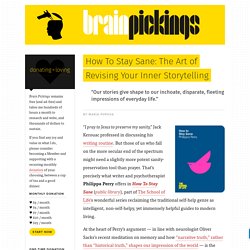
But those of us who fall on the more secular end of the spectrum might need a slightly more potent sanity-preservation tool than prayer. That’s precisely what writer and psychotherapist Philippa Perry offers in How To Stay Sane (public library), part of The School of Life’s wonderful series reclaiming the traditional self-help genre as intelligent, non-self-helpy, yet immensely helpful guides to modern living. Helen Keller on Optimism. By Maria Popova “Doubt and mistrust are the mere panic of timid imagination, which the steadfast heart will conquer, and the large mind transcend.”
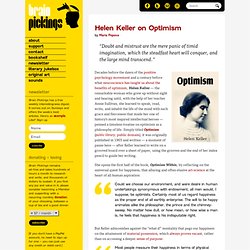
Decades before the dawn of the positive psychology movement and a century before what neuroscience has taught us about the benefits of optimism, Helen Keller — the remarkable woman who grew up without sight and hearing until, with the help of her teacher Annie Sullivan, she learned to speak, read, write, and inhabit the life of the mind with such grace and fierceness that made her one of history’s most inspired intellectual heroes — penned a timeless treatise on optimism as a philosophy of life. Simply titled Optimism (public library; public domain), it was originally published in 1903 and written — a moment of pause here — after Keller learned to write on a grooved board over a sheet of paper, using the grooves and the end of her index pencil to guide her writing.
Limbic Revision: How Love Rewires the Brain. 5 Ways To Rewire Your Brain For Meaningful Life Changes. Neuroscientists have discovered the strategy for rewiring the brain.
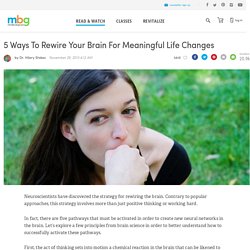
Contrary to popular approaches, this strategy involves more than just positive thinking or working hard. In fact, there are five pathways that must be activated in order to create new neural networks in the brain. How To Rewire Your Brain & Get Happy Right Now. For years, I felt swallowed up by life.

I gained baby weight and hated my body. I sat at home, feeling like I should be grateful for the opportunity to stay with my little ones, but instead, I felt unfulfilled, ungrateful and trapped. I looked around at the other moms who looked like they had it ALL together (i.e., looking cute and NOT wearing yoga pants) and felt like a loser because I was miserable but couldn’t see any way out.
I tried shaming myself out of my funk. Hardwiring Happiness. Rick Hanson is a master of his craft, showing us a wise path for daily living in this book.
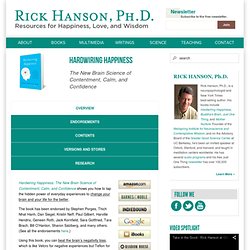
Based in the latest findings of neuroscience, this book reveals that if we understand the brain a little, we can take care of our lives a lot, and make a real difference to our well-being. Here is a book to savor, to practice, and to take to heart. –Mark Williams, Ph.D., Professor, University of Oxford, author of Mindfulness The cultivation of happiness is one of the most important skills anyone can ever learn. Luckily, it’s not hard when we know the way to water and nourish these wholesome seeds, which are already there in our consciousness. In this remarkable book, one of the world’s leading authorities on mind training shows how to cultivate the helpful and good within us. Body Atlas Reveals Where We Feel Happiness and Shame. Yellow shows regions of increased sensation while blue areas represent decreased feeling in these composite images.

Image courtesy of Lauri Nummenmaa, Enrico Glerean, Riitta Hari, and Jari Hietanen. Chests puffing up with pride — and happiness felt head to toe — are sensations as real as they are universal. And now we can make an atlas of them. Researchers have long known that emotions are connected to a range of physiological changes, from nervous job candidates’ sweaty palms to the racing pulse that results from hearing a strange noise at night. But new research reveals that emotional states are universally associated with certain bodily sensations, regardless of individuals’ culture or language. Once More With Feeling More than 700 participants in Finland, Sweden and Taiwan participated in experiments aimed at mapping their bodily sensations in connection with specific emotions. Hot-Headed The findings enhance researchers’ understanding of how we process emotions. How to Harness Your Brain's Dopamine Supply and Increase Motivation.
Why your brain needs breaks from work. As if we really needed more science to tell us to take a break from work.
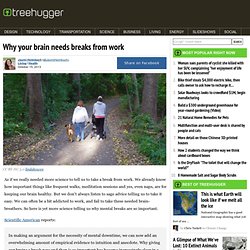
We already know how important things like frequent walks, meditation sessions and yes, even naps, are for keeping our brain healthy. But we don't always listen to sage advice telling us to take it easy. We can often be a bit addicted to work, and fail to take these needed brain-breathers. So here is yet more science telling us why mental breaks are so important. Scientific American reports: Mihaly Csikszentmihalyi: Flow, the secret to happiness. How To Boost Your Mood In 20 Seconds Or Less. Sometimes the simplest way to drop the "baditude" and bring on the happiness can come through an everyday action.

Certain actions activate oxytocin, aka "the love hormone," which is known to induce feelings of love, trust, and a sense of bonding. When you’re feeling funky, oxytocin can turn your mood around, make you feel more connected and revive your overall energy. There are a few natural ways to rev up the oxytocin engine when you’ve got the blues.
These great tips can be applied anywhere, anytime. Take a minute for a miracle and let the love hormone lead the way. The first tip is to place your hand on your heart.